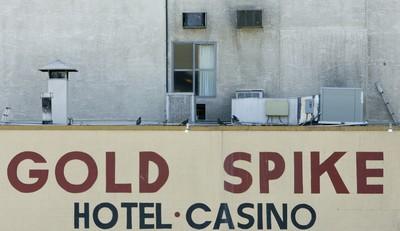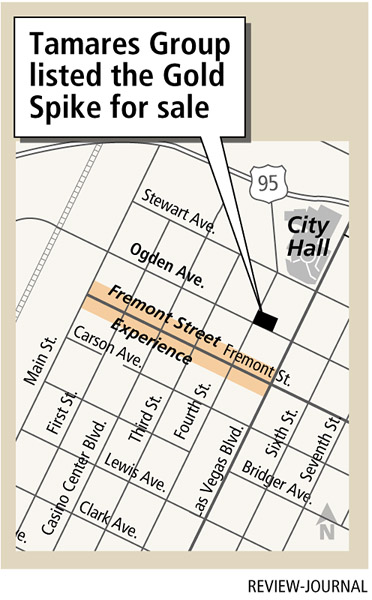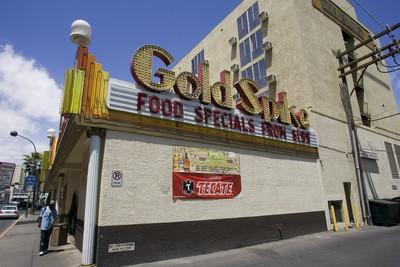DOWNTOWN PROPERTY: $15 MILLION



One of the smokiest dives in downtown Las Vegas could fetch $15 million for its European owners.
The Lichtenstein-based Tamares Group on Thursday announced it wants to sell the Gold Spike, a longtime local grind joint at the intersection of Ogden Avenue and Fourth Street.
If Tamares gets what it wants for the run-down hotel it could lead to another downtown redevelopment project at an intersection that’s already home to two other reclamations, the Neonopolis mall, which is being renamed Fremont Square, at Fremont and Las Vegas Boulevard and the Lady Luck on Third Street between Ogden and Stewart avenues.
“The obvious opportunity is for somebody who would like to get licensed,” said John Knott, executive vice president for CB Richard Ellis Global Gaming Group, the company with the Gold Spike listing. “I think somebody is going to at least build a business there.”
Knott said the minimum offer owners would consider for the casino and 109-room hotel with one acre of real estate is $15 million. Clark County property records indicate the last sale price for the building and parking lots was $11.6 million in several transactions in 2004.
The prospect of new owners breathing life into another faded property adds momentum to a real estate renaissance that’s attracted increasing investment in recent years.
“It is a third-tier property that has an opportunity to transform itself,” said Jeremy Aguero, principal analyst at Applied Analysis, of the Gold Spike. “There is a lot of speculation. There is something like $4 billion in total redevelopment that are going into that downtown region alone.”
But others doubt downtown Las Vegas will ever regain the luster that made Glitter Gulch a desirable American vacation destination.
Matt Weatherford, a longtime downtown visitor who writes online reviews of Las Vegas casinos, said the story of the Gold Spike is one of continued decline — at least in gambling and ambience.
Since Tamares, along with former partner Barrick Gaming, bought the Gold Spike and several other downtown properties in 2004 from longtime owner Jackie Gaughan the casino has transformed from a grind joint with decent rooms, cheap food and fun gambling to a downtown outpost with less charm than before.
“It was a dive, but it was fun. You never felt intimidated there and you got to meet some really interesting characters,” said Weatherford, who until this year held an annual party at the Gold Spike for friends and readers of his Web site.
With the table games gone and the casino restaurant menu pared down, Weatherford moved the 2007 event to the Gaughan-owned El Cortez.
“Now the social activities are gone,” he said of the table game-free Gold Spike. “It is just a lot of people playing slots.”
Gaughan took over the Gold Spike in 1983, said Mike Nolan, general manager and chief operating officer of the El Cortez and a longtime Gaughan employee. Nolan said the casino had been closed for several months when Gaughan took over at the request of bankers who wanted to sell the property.
“It is hard to sell a casino that is closed,” Nolan said.
No buyers stepped forward so Gaughan added the Gold Spike to his portfolio, Nolan said. He ran it until 2004 when he sold it to the Barrick and Tamares partnership.
“It did real well for us,” Nolan said.
Before Gaughan there was a succession of three owners and a name change from the Rendezvous to Gold Spike, he said. According to Clark County property records the building was constructed in 1976.
Representatives from Tamares in London and New York were unavailable for comment. But in a statement the company said it planned to keep its other downtown hotel-casinos: the Plaza, Las Vegas Club, Western Hotel and Nevada Club.
“We are invested in downtown for a reason,” Kenneth Landfield, chief operating officer of Tamares U.S. Real Estate, said in the statement. “We see great potential to turn it into one of the nation’s finest urban centers. And we look forward to being a big part of that process.”
Knott said there are myriad ways a new owner could squeeze value from the Gold Spike. The primary opportunity would be using the casino to gain a relatively low-cost foothold in the Las Vegas gaming market compared to the Strip where operators spend several billion dollars to build a resort.
He also touted the location of the Gold Spike in relation to a potential sports arena downtown. The arena, however, remains little more than an idea with no investors, no tenants-in-waiting and no agreed-upon site.












